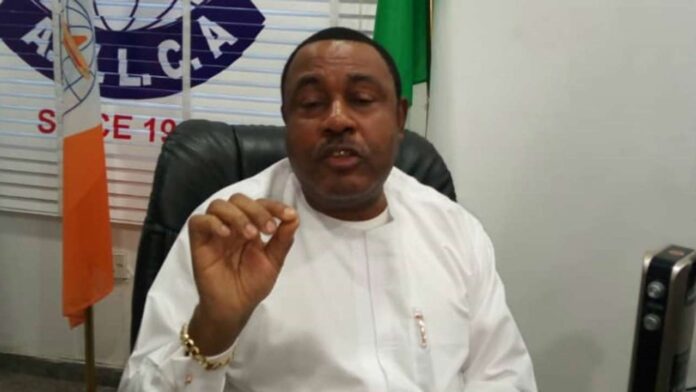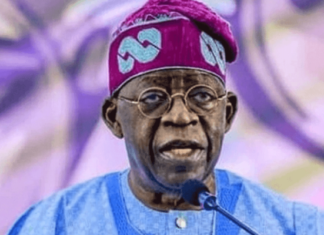Shipping firms make things difficult for importers in Nigeria through extortion and high charges
By Uzor Odigbo
President of the Association of Nigerian Licensed Customs Agents (ANLCA), Iju Tony Nwabunike has stated that Nigerian Shipping Companies extort importers and agents to the tune of N12 billion annually.
According to him, equipment detention charges of N200,000 per 1×40 container and N100,000 per 1×20 container; plus a backhand collection of N150,000 on empty containers and many other extorting means have caused cumulative losses of over N1bn monthly to importers, customs brokers and freight forwarders.
Nwabunike who stated this during his keynote address titled ‘Reversing Nigeria’s Unproductive Port System for Efficiency’ at JournalNG’s Port Industry Town Hall Meeting with the theme: “Towards Hitch Free Port Operations In Nigeria” in Lagos, added that the figure is likely higher if a case by case computing is done nationwide.
RELATED
Holding Bays: How shipping firms are frustrating trade at ports
Shipping firms, worst employers of labour in Maritime, says Adeyanju
“Today we are stuck with corporate deviant behaviours by shipping companies, who undermine our national economic interest for their own gains and enjoy a field day due to lack of powers of sanction by law on the part of the government.
“The shipping companies cheat us to cause inflation, because, for every avoidable increase and extortion they perpetuate, the final consumers pay more in the market. They largely have become impediments to the government’s ease of doing business
agenda with their various mode of extorting port users and slowing down trade.
“As a way of helping the government, who seems helpless in the face of obvious
non-compliance across the board, private sector groups in the port have established
compliance teams and this points to our collective inadequacy.
“Without sounding sarcastically simplistic, I make bold to say that a hitch-free port operation in Nigeria is achievable only if we get our processes right, apply technology-based solutions, put workable infrastructures in place and adopt attitudinal compliance towards achieving these goals”.
The ANLCA boss expressed disappointment seeing how Nigeria struggles to administer trucks entering and exiting the port areas in this 21st century.
“People talk about disorderliness and inability to track extortionists along the port corridor. I want to tell us here that Nigeria is not ready to solve this challenge for now.
“My logical leaning tells me that in solving a problem, you identify and address its cause. The expectations of port concession have not been adequately met, majorly because Nigeria put the cart before the horse.
“The port access roads though under construction with some areas already completed is being handled too slowly. The Federal Government should declare it a national emergency where, during dry season construction work should be done 24 hours nonstop, especially on the Apapa- Oshodi axis.
“Having Close Circuit Television (CCTV) cameras along our port access roads addresses the challenges of impunity, bribery and extortion along the corridor scientifically.
“Concession was done; concessionaires took over before Nigeria started thinking about an industry regulator. The legal instrument that should come through legislation or an amendment to the enabling Act of the Nigerian Shippers Council is still awaited. It’s almost seven years after President Goodluck Jonathan through a Gazette, granted it regulatory powers on March 2015, but the law is still not in place”, he said.
Nwabunike knocked the Nigeria Customs Service (NCS) for failing to embrace change, noting that the hundred per cent physical examination often talked about is a primitive and outdated aspect of customs operation, which also contributes to the delays encountered by importers and agents.
He pointed out that for years, the service has been operating without scanners and the few ones that were recently procured are lying unused while officers manually go through physical examination of cargoes.
He continued: “I don’t want to say our port system is about the worst in the maritime world. Sadly, that is what it is looking like in terms of shipping companies and customs operations.
“Nigeria is the only country I know in the world where cargoes are subjected to joint manual and very cumbersome examination process and as an importer or customs broker, you are subjected to multiple alerts by different customs units.
“After exiting the ports for about 500 meters away, you are stopped by customs again for either another round of checks. In some cases, they take you to another customs unit to either reexamine your cleared cargoes, wasting your time by looking for fault to delay you which leads to extortion. If you don’t want your time wasted, of course, you know what to do to save your time.
“Where faults are found, the system is skewed to lay blame and impose sanctions on importers, customs brokers and haulage operators and in most cases leaving the collaborating customs officer to go scot-free. “Customs release, customs seize” has become a notorious slang in our daily port encounter. This doesn’t speak well of our system”.
Commenting on Nigeria’s quest towards attaining a hub port status in West and Central Africa, he said that we are not close to achieving the feat.
He highlighted an under-regulated system; high cost of doing port business; time-wasting and extortion, in addition to other natural deficiencies like the type of Port and draft as the reasons for the drawback.
“What about the single African market under the aegis of African Continental Free Trade Area (AfCFTA)? African incomes under AFCFTA according to a World Bank report, may hit $450b but what does Nigeria stand to gain from the single market when she seems unprepared?
“The AFCFTA represents a major opportunity for countries to boost growth, reduce poverty, and broaden economic inclusion. Ports play very critical role in all of these but ours is yet to attain such potentials. We should be truthful to ourselves if we must make progress.
“We are nowhere near our peers to maximize the benefits of our port system for this single African trade regime. The earlier we act fast, the better because under the regime countries will see themselves as rivals and competitors on certain economic fronts. Nigeria must not be caught sleeping. Smaller neighbouring countries have developed their ports, mainly for cargo to be consumed by Nigeria.
“We are here running without dependable port procedures and having no roads to
our major seaports in Lagos, Onne and others”, he said.
Nwabunike suggested six solutions that can help to improve the efficiency of the Nigerian port system. They are: “Putting in place the legal instrument for proper and effective port regulation has become imperative.
“People with knowledge about the port system should be given the opportunity to run it. This area should not be seen or treated as a place for political compensation.
“Compliance across the board should be encouraged and rewarded. Persons with tendencies to abide by rules are encouraged when they see those acting wrongly, face sanctions.
“Adequate use of technology for access control, profiling and detection of infractions will go a long way in strengthening our system.
“Fixing port infrastructure like roads, holding bays, truck parks and others have become very imperative.
“General attitudinal change of all players is a vital key. We can’t keep doing things
our old ways and expect new results”.














